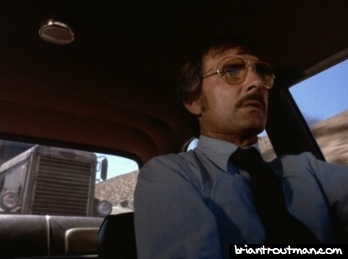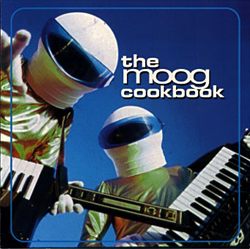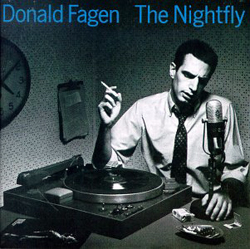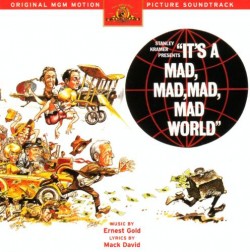It’s a Mad Mad Mad Mad World Soundtrack — Ernest Gold
by Brian Troutman on Feb.08, 2008, under Reviews
Ernest Gold was so adept at his craft, it is hard to believe that much of his career was spent scoring unremarkable television programs and B-movies. His long-running relationship with director Stanley Kramer led to many collaborations, including It’s a Mad, Mad, Mad, Mad World in 1963. Billed as “the comedy to end all comedies,” this star-studded, Ultra Panavision 70 spectacle needed a rollicking soundtrack to match. And that, Ernest Gold delivered. Gold’s “merry-go-round” approach captures the essence of Mad World’s fruitless race perfectly; carefully orchestrated themes reflect and magnify the on-screen action.
That stated, this compilation has its shortcomings. (continue reading…)
Duel – Steven Spielberg, Dennis Weaver
by Brian Troutman on Apr.01, 2005, under The Greatest

Dennis Weaver outruns a blood-thirsty Peterbilt in Duel
The greasy rig and its concealed driver represent the evil Halliburton and the corrupt Dick Cheney, respectively, and David Mann is the downtrodden proletariat…
OK, I have not actually read that in some self-important dunderhead’s analysis of Steven Spielberg’s 1971 film, but I wouldn’t be surprised if such drivel disgraced the screen of my Mac someday while I’m doing some “research” on the Internet. Duel is routinely and rightfully praised as a triumph of minimalist moviemaking, but it is also subject to endless interpretation. Every idiot seems to know the true meaning that lurks beneath the movie’s 90 minutes of Peterbilt/Plymouth rivalry. But who gives a you-know-what?
Basket Case – The Moog Cookbook
by Brian Troutman on Mar.01, 2005, under The Greatest

The Moog Cookbook
If anyone ever holds a contest for “Most Mispronounced Name,” Bob Moog would have to fight it out with Wilkes-Barre for the grand prize. Moog, whose name rhymes with rogue, invented the analog synthesizer around 1964, and his instrument brought a very new and very unique sound to the music world. While its sound was considered unearthly and futuristic at first, the Moog synthesizer matured into a regular fixture of popular music by the 1970s.
Two decades later, Roger Manning, then part of a retro rock band called Jellyfish, was not finding any market for his style of music. The early ’90s music-buying crumb crunchers were busy spending their entertainment dollars on “alternative” rock from groups like Nirvana and Pearl Jam. Jellyfish folded in 1994, but Manning partnered with Brian Kehew to form a new group, the Moog Cookbook two years later.
Alice Childress – Ben Folds Five
by Brian Troutman on Nov.01, 2004, under The Greatest

Ben Folds Five
In the mid 1990s, a trio from Chapel Hill, North Carolina emerged from the local NC indie-rock scene to national prominence. Interestingly enough, Ben Folds Five was set apart from other groups by what it lacked: a guitar player. Instead, the band’s high-powered tunes were fueled by the masterwork of namesake pianist Ben Folds, a master at the ivories who could probably one-up the likes of Elton John and Billy Joel in the realm of pop piano.
The group’s self-titled 1995 debut album features a dozen tightly crafted songs, most with a comically impish streak. The antics are partially (and I should stress not fully) balanced by a couple of more sedate and serious numbers, including the contemplative “Alice Childress.”
International Geophysical Year (I.G.Y.) – Donald Fagen
by Brian Troutman on Oct.01, 2004, under The Greatest

Donald Fagen - The Nightfly
Donald Fagen is perhaps best known as one of the two principals behind the ’70s jazz-rock fusion (I hate that term) group, Steely Dan. As listeners follow Donald Fagen, Walter Becker, and a rotating group of highly skilled hired hands through the group’s discography, they will note that each successive album becomes more polished, more calculated, and that rock and roll stylings take a back seat to blues-inspired riffs and jazz-based chords that are ingeniously interwoven with enigmatic lyrics to create unique and captivating musical experiences.
The 1980 release Gaucho marked Steely Dan’s last studio album (for the next two decades, at least), and someone searching a database only for “Steely Dan” would miss one of the greatest entries in Fagen’s entire career. A solo effort, The Nightfly, was released in 1982, and the entire album deserves a “Greatest” mention, but the standout is Fagen’s most successful solo single, “I.G.Y.” (continue reading…)
